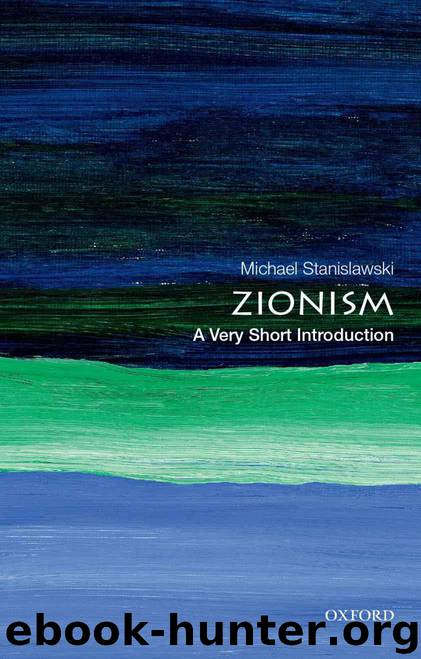Zionism: A Very Short Introduction (Very Short Introductions) by Stanislawski Michael

Author:Stanislawski, Michael [Stanislawski, Michael]
Language: eng
Format: azw3, epub, azw
ISBN: 9780199911905
Publisher: Oxford University Press
Published: 2016-10-31T16:00:00+00:00
And so in the late afternoon of Friday, May 14, 1948, a few hours before the British Mandate for Palestine was set to expire at midnight, David Ben-Gurion hastily made plans for a history-making event, the culmination of the Zionist dream since 1897: a declaration of an independent Jewish state in Palestine, to be called the State of Israel.
On some level this was a strange name to be chosen for the new state: after all, in the Bible “Israel” was the name of the Northern Kingdom, the state that never truly transcended its paganism and thus lost out to the southern kingdom, “Judah,” chosen by God. But Ben-Gurion’s intuition was that a state named “Judah” or “the Jewish State” would not have the same resonance as “Yisrael,” most significantly because of the millennial connection of that name to the Jewish people around the world—am yisrael—and to the Land of Israel: erez yisrael.
And so the Declaration of Independence of the State of Israel was read aloud in a solemn ceremony in Tel Aviv that Friday afternoon. Its text was rather hastily drafted and redrafted—the final version was revised so near to the time of the announcement that Ben-Gurion had to read it from a typed piece of paper, rather than the scroll that was ceremoniously signed afterward.
The text itself was a deft articulation of the secular, moderate, socialist Zionism of the majority of its signers, implicitly rejecting the views of Orthodox, Revisionist, and Marxist Zionists. Most cited in later decades was its vision of social justice and religious freedom: the state “will foster the development of the country for the benefit of all its inhabitants; it will be based on freedom, justice and peace as envisaged by the prophets of Israel; it will ensure complete equality of social and political rights to all its inhabitants irrespective of religion, race or sex; it will guarantee freedom of religion, conscience, language, education and culture; it will safeguard the Holy Places of all religions.” Equally well-known, though often elided in official Israeli government translations of the declaration, was the deliberate and emphatic omission of the word “God” in the founding document of the Jewish state, since (once more) neither Ben-Gurion nor most of his colleagues believed in any traditional conception of a divinity. To appease the few Orthodox figures invited to sign the declaration, the drafters settled on the phrase zur yisrael—the Rock of Israel—which is one of the euphemisms used in Jewish liturgy for God, but could also be interpreted in non-theistic symbolic ways or even literally as the land of the Land of Israel.
Far less well known is the corollary to the God issue, perhaps even more radical in its bracingly secular Zionist ideology: the declaration made absolutely no mention of any divine promise of the Land of Israel to the Jews. Rather, it states that in the Land of Israel the Jewish people gave to the world the “Book of Books”—that is, the Bible was created by the Jewish people in their own land, not revealed by God to the Israelites at Sinai.
Download
Zionism: A Very Short Introduction (Very Short Introductions) by Stanislawski Michael.epub
Zionism: A Very Short Introduction (Very Short Introductions) by Stanislawski Michael.azw
This site does not store any files on its server. We only index and link to content provided by other sites. Please contact the content providers to delete copyright contents if any and email us, we'll remove relevant links or contents immediately.
| Anarchism | Communism & Socialism |
| Conservatism & Liberalism | Democracy |
| Fascism | Libertarianism |
| Nationalism | Radicalism |
| Utopian |
The Secret History by Donna Tartt(16618)
The Social Justice Warrior Handbook by Lisa De Pasquale(11489)
Thirteen Reasons Why by Jay Asher(7786)
This Is How You Lose Her by Junot Diaz(5768)
Weapons of Math Destruction by Cathy O'Neil(5034)
Zero to One by Peter Thiel(4823)
The Myth of the Strong Leader by Archie Brown(4789)
Promise Me, Dad by Joe Biden(4444)
Stone's Rules by Roger Stone(4415)
Beartown by Fredrik Backman(4413)
How Democracies Die by Steven Levitsky & Daniel Ziblatt(4397)
The Fire Next Time by James Baldwin(4341)
100 Deadly Skills by Clint Emerson(4076)
A Higher Loyalty: Truth, Lies, and Leadership by James Comey(4031)
Rise and Kill First by Ronen Bergman(4012)
The David Icke Guide to the Global Conspiracy (and how to end it) by David Icke(3881)
The Farm by Tom Rob Smith(3871)
Secrecy World by Jake Bernstein(3782)
The Doomsday Machine by Daniel Ellsberg(3730)
